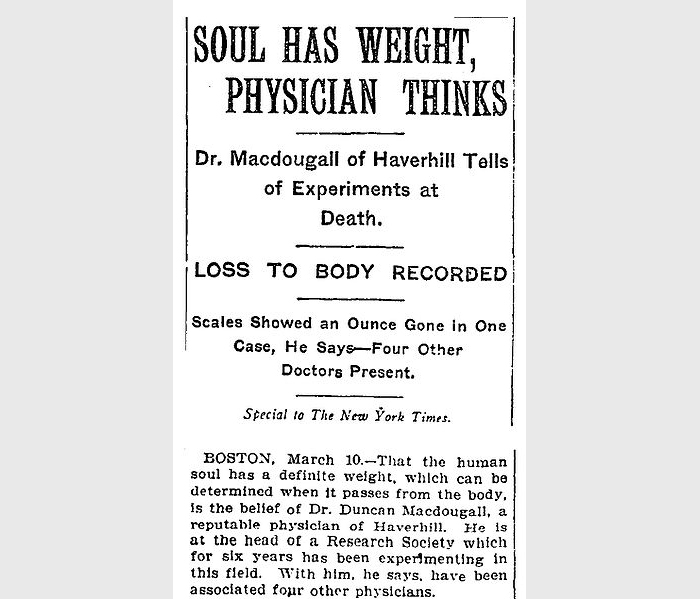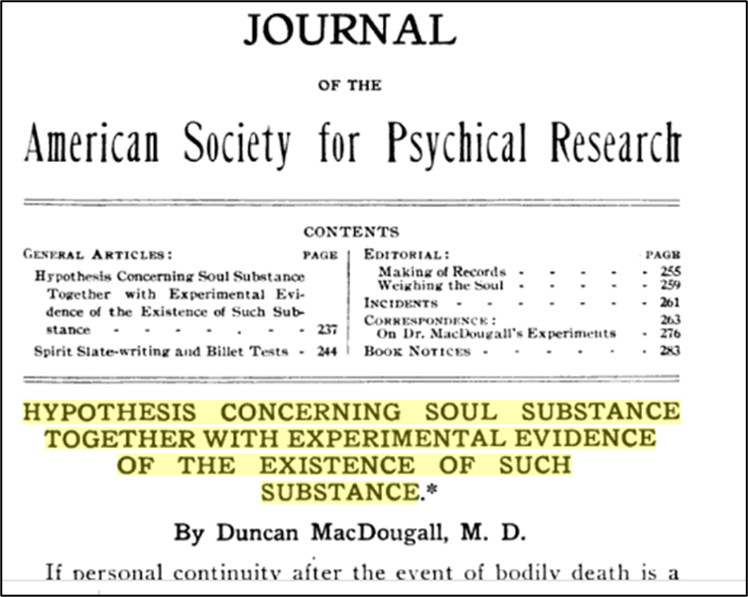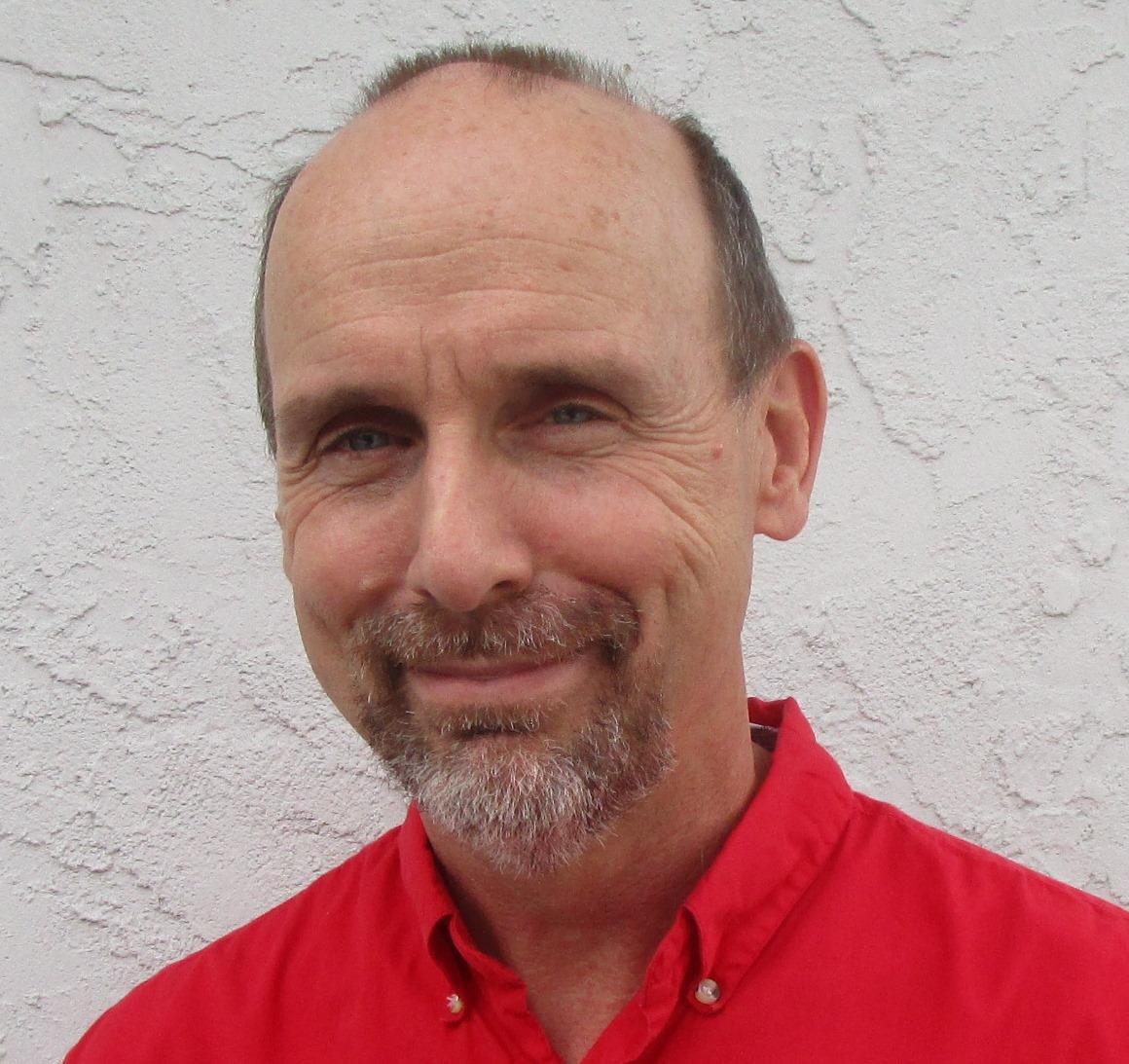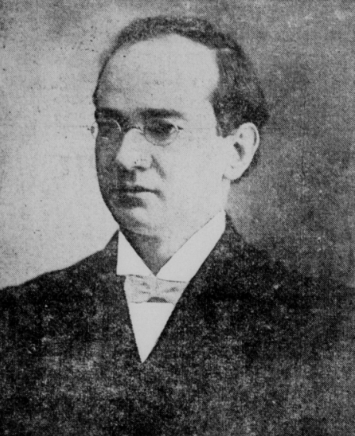Unsettled Science- The Search for the Soul
I love history. As a writer, I try and weave as much of it into my novels as possible. My latest horror/thriller Demon Dagger is about demons escaping from Hell, bodily possession, and the selling of souls. Believe it or not, some interesting history ended up even in a story like this. Many believe the souls my fictional demon craves exist, but back in 1907, one man in Haverhill, Massachusetts tried to prove it.
Duncan MacDougall wasn’t a religious zealot or an obsessive spiritualist. He was a certified medical doctor. His theory was that if a soul (or “continuing personality after death” as he put it) existed as an individual thing tied to a specific person, that soul had to be physically part of that person, and that soul would have mass. If the soul continued to exist post-mortem, it would be possible to see a loss of mass after the moment of death. Some of his reasoning was wrapped up in the concept of “ether”, a common scientific misconception of the time, but the logic behind his experiment design was solid.
MacDougall approached his experiment with the soundest of contemporary scientific methods. He built a delicate scale accurate to two-tenths of an ounce that included his subject’s deathbed. He carefully calibrated the apparatus and was certain to account for a host of potential losses like post-mortem voided waste and exhaled final breaths. Then, as subjects, he used individuals on the verge of death with diseases that kept them immobile during their last moments on Earth, lest their movements upset the sensitive scale.
Starting in 1901, he began to conduct his experiments. How he got voluntary participants for them is not documented, but he must have been quite a salesman. Over about a year, he performed the experiment six times. Two of the experiments he discounted because of measuring errors or in one instance “interference by people opposed to our work.”
The four experiments in which he had faith all showed near-immediate losses of mass at the moment of death. This amount varied by individual but was less than an ounce, averaging out to 21 grams.
Coincident with his last set of human experiments, he performed the same experiments on twelve dogs with a variety of weights, using scales with a higher accuracy of a sixteenth of an ounce. In every instance, there was no weight loss for the dogs after death. The phenomenon he was observing only occurred in humans, and if other animals showed the same post-mortem results, his conclusion was that only humans had souls.

With his experiments far from complete, a reporter got wind of what he was doing. In April 1907, The New York Times published an article about his work that was subsequently picked up by other newspapers across the country. MacDougall was appalled. The story contained some factual inaccuracies, but worse, having his work reported by the press, instead of in an academic journal, sapped it of any scientific credibility.

MacDougall went right to work and by May of 1907 had an article published concurrently in both the journals American Medicine and the Journal of the American Society for Psychical Research. In the article he described his experiments in detail and even concluded with saying the results were preliminary. He encouraged other doctors to perform similar tests to prove or disprove his theories.
MacDougall took an immediate pounding from the medical establishment, often dismissing the theory he was researching without looking at the research itself. Others raised questions about his protocols that were already answered in his journal articles. In the end, no other doctors performed any experiments to validate or invalidate his work. To his own frustration, all his research became a dead end. MacDougal later died at the early age of 54.

In Demon Dagger, the demon feeds on the offered souls of the living. Bereft of the divine spark and moral compass the soul provides, these people become dangerous sociopaths. MacDougall’s experiment gave me a framework for that idea, and while no one else built on his work, I had someone do so in the novel. In my fictional experiment, a skeptical doctor performs the same experiments using Texas death row inmates. He debunks MacDougall since none of the dead lose any mass. But the demon hunters know the tests actually validate MacDougall, because the Texas experiments were on soulless sociopaths.
Today our scientific methods are more advanced. We also have documented proof of post-mortem consciousness in hospital rooms, and that points to some form of life after death. Will anyone find a way to ethically repeat MacDougall’s experiment? Probably not, but if they do, I’ll be waiting on the results. I bet I can work them into a Demon Dagger sequel.
(First two images copied from the Wikimedia Commons website. Journal image copied from Google Books.)


